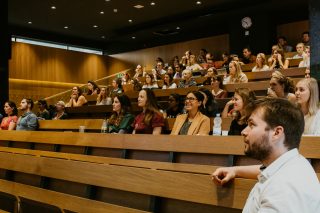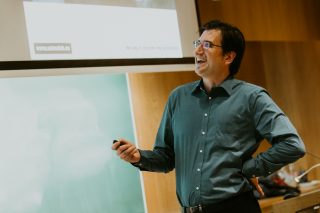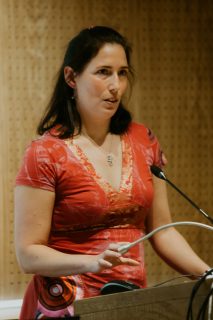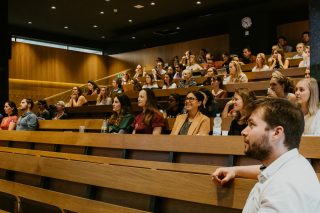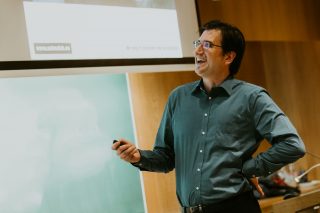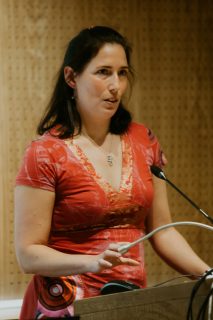On 24 October, the University of Veterinary Medicine held its second Career Day to provide first-hand tips and advice for students on their career opportunities after graduation. What a good workplace is like, where we should look for jobs and why it’s (also) worth working abroad – the participants got the answers for these questions and learnt a lot of other interesting information, too.
This year’s Career Day featured 4 veterinarians Amelia Stevens, Olga Tretter, Mark Hedberg and Dániel Pleva giving presentations and sharing their experience with the students attending the event. In his opening remarks, the University’s vice-rector for international affairs Dr. Tibor Bartha explained that the secret of a successful job search, even for veterinarians, lied in the so-called soft skills such as communication, organization and teamwork. The purpose of the Career Day event is to enable veterinary graduates to pass on their skills and their own experience to the students so that they could be prepared for the labour market.
The first presenter was Amelia Stevens who talked about the sometimes winding road of becoming a veterinarian. Amelia graduated in 2016 from the Faculty of Veterinary Medicine, which was a part of Szent István University at the time. Then she worked in Wales for 2 years “with all kinds of small and large creatures”, as she put it. Talking about getting your first job, she gave some useful tips to students, showing them where they should search and shared some of her experience as to what you should look for when researching an employer. She also showed some good practices in terms of CVs such as: “never use the same CV for two different applications” and emphasized some key points you should consider in your job interview: “The purpose of the job interview is not just for the future employer to decide if they want you. It’s also for you to find out if the position suits you.” Drawing on her own experience, she explained to students how they could survive the first weeks and months, for example: always be nice to nurses, always know where to find things in the surgery and always keep good sources (applications, books) around. No doctor knows everything, there will always be unexpected and unknown situations but the more experience you gain, the more adept you will become at handling them, she said. Patients will not be interested in how much you know. They are interested in how much you care about them. Amelia concluded her presentation with 10 tips on what new graduates should be prepared for, including such useful pieces of professional advice and wisdom as: “If you work with dog cadavers, fleas will jump on you since you are the closest being with a heartbeat. Accept this fact and learn how to jump away.”
In his presentation titled “How much do you know about crocodiles?” Mark Hedberg gave students an insight into overseas job opportunities. How do vets work there? What jobs are available and what assistance can a surgeon expect overseas? According to Mark, the benefits of working abroad lie in gaining professional experience, personal growth, career advancement and, of course, being involved in very interesting activities.
The hardest factors about practising veterinary medicine outside the EU, in the US or Australia are that you are often left to your own devices; you get no support and you often need to make decisions without the appropriate tests and diagnostic tools (X-ray, CT). The equipment, the drug supply and often the patients’ financial means are severely limited. However, bad conditions can never be an excuse for any inadequate treatment. Challenges can be overcome, helping you to improve your diagnostic and practical skills and learn more about local infections. You can heal with insufficient tools, too, as long as you focus on what you can do with the devices at your disposal. Even the surgical tricks of old books may come handy at times.
He explained that working overseas may sometimes be hard and exhausting but it’s worth taking on the challenge because you can learn skills that no other work environment would give you, and it looks good in your CV, too. If you are able to treat an animal without almost any tools and drugs what could you achieve in a properly equipped surgery?
The next presenter was PhD student Dániel Pleva who talked about the benefits of being involved in a doctorate programme. You are no longer a student but you haven’t entered the labour market yet – that’s the kind of duality all PhD students live with. Besides listening to fantastic lectures, conducting research and experiments, PhD students also attend professional conferences (often through third-party funding) while working on their own thesis.
The fourth and last lecture of the second Career Day was delivered by our University’s alumnus Olga Tretter who graduated in 2010. She began her presentation by giving an insight into her own career. After obtaining her degree, she began working in a pet surgery in Balatonalmádi, Hungary. Then she moved to the UK to work. Eventually, she returned to Hungary and currently runs a pet practice as a co-owner and lead veterinarian. She explained that her biggest fears in terms of working abroad were due to language difficulties. She was also concerned that her knowledge might not be sufficient or she couldn’t fit into the team. Lastly, she also felt bad to leave her friends and family behind but she needed to take this step to achieve her goals. Today she has her own practice but she still faces challenges such as managing employees, supporting her colleagues and constantly keeping up with the latest developments in her profession. It’s sometimes difficult for her to unwind, set her work aside and just relax. She finished her speech by sharing what she could only learn about her profession after graduation: you can never know everything but you can always do your best to be a thorough and caring vet. You must set the proper boundaries between your job and your private life to preserve your health.
After the presentations, the participants of the second Career Day concluded the evening with a little wine tasting, then blew off some steam in the EQUUS Club.

